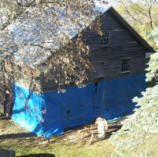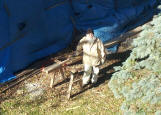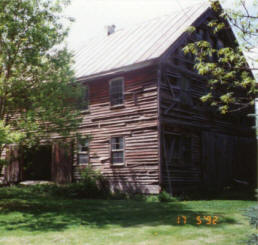|
Watch for an
official Virtual Reality walk-thru experience soon of the National Register
Lutze Housebarn!


November 2017 saw us putting the finishing touches on the final corner of the
Lutze Housebarn's main barn foundation. That means the entire perimeter of
the main building was structurally complete and sitting on a solid foundation!!
Now on to the ~1890 'addition' foundation and timberwork on the west end.
The Lutze Housebarn was built in 1849 by Gottlieb and Fredericka Lutze.
The building is dual house and barn under one roof in the Old World
German Tradition. This three floor
timber structure with brick fruit cellar, is on the National Registry of
Historic Buildings, listed as nationally significant, and is being considered as
a National Landmark. It is one of
three known buildings of its kind in the United States, according to the
Director of the National Parks Service. It
was also listed in 1994 as one of the ten most endangered buildings in Wisconsin
worthy of preservation by the Wisconsin Trust for Preservation.
The Lutze Housebarn is part of an Old World  courtyard style farm yard
that is representative of the tradition of the entire Centerville area. The half timber style Housebarn is unique for its
'fechtwerk' construction
and its size. courtyard style farm yard
that is representative of the tradition of the entire Centerville area. The half timber style Housebarn is unique for its
'fechtwerk' construction
and its size.
The family lived on the east end and the livestock on the west end of the
building. Large animals were housed on the main floor as well as the
cooking activities. As heat rose,
it helped to warm the smaller animals and bedrooms on the second floor. The third floor was used for
grain in the earliest days, then straw and hay storage in the 1880's, both acted as
insulation.
Centreville Settlement, Inc. is restoring the building to the 1880ís.
The majority of the work has been done by dedicated volunteers. A goal of the
restoration is not only preservation of the building but the preservation of the
building skills and techniques needed to construct the original building. The Lutze Housebarn restoration is the only known project that invites
visitor and volunteers to hands-on learning of timber framing, stone masonry,
joinery, timber shaping, interior preservation, artifact cataloguing, etc..
Visitors have participated in an archeological dig, documenting for the
National Archives, documenting and stored artifacts, and are learning heritage orchardry. They have worked with
original tools shaping timbers or placing stones. They have participated in the camaraderie of a work day as
the settlers may have experienced, and enjoyed many a communal farm style lunch.
Primary Lutze Housebarn
restoration goals for 2012 were to:
-
Conclude sill timber
replacement and wall posts in east end wall
-
Cut joinery and install
replacement vertical timbers first floor east end (several removed in
1930's)
-
Establish structural support
for east (gable) end in order to replace a rotted horizontal timber midway up
-
Repair and stabilize foundation and arched cellar as needed,
primarily east end
-
Figure out technique and
equipment needed for replacement or stabilization (with lifting) of interior
sill beams
-
Continue and expand artifact
shelving and storage improvements in the third level
And for 2013 we hoped to:
-
Install siding on the north wall
-
Install nogging staves as infill
in the east wall
-
Rip and hew replacement sill
for the north wall of the 1890's addition from white oak log
In 2017 we:
In
2022 we:
-
finished stone masonry under
the north end of the west side addition
-
decided approach and
proceed on window and door finish carpentry
-
reduced damaging UV light
coming through south windows
In 2023
we:
-
concluded timber wall replacement and staves on the east lower level,
concluding exterior walls for the building
-
repaired window framing materials, concluded permanent or 'place holder'
window frames on the first floor, focusing on the exterior so we will be
ready for siding 2024
And for 2024:
-
replace a 2nd floor
timber/joist in the addition
-
replace a vertical post in
the 2nd floor south side that was removed in about 1930
-
jacking up the center of
the building which is now lower than the now new and solid perimeter
foundation and sill beams
-
install replacement or repaired sliding doors on the 1890's addition
-
Replace three
swinging exterior doors and
associated trim work
-
Replace brick floor in
kitchen area
-
install siding
-
regrade southside for appropriate drainage and minor repair masonry to halt
root cellar rainwater seepage
Planning ahead for 2025:
-
install wooden rain
gutters to match the original
-
Replace brick floor in
kitchen area
-
install wooden rain
gutters to match the original
-
interior timber walls in entryway/kitchen and between the 'living room' and
the 'north room'
We hope you can come and
work with us, share your talents, learn new things, and
enjoy the satisfaction of knowing what a difference you can make!! For
street address and directions,
click here.
|